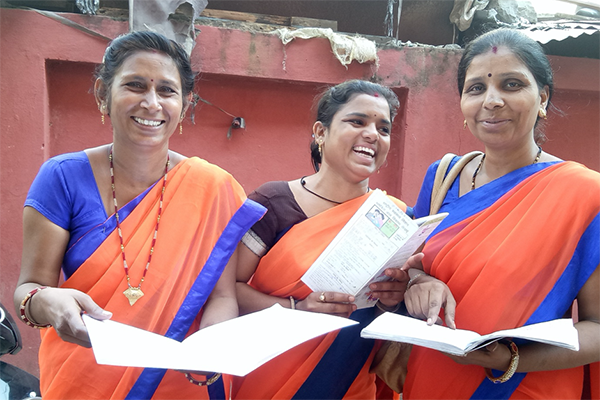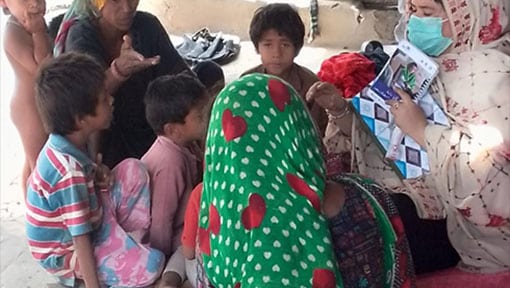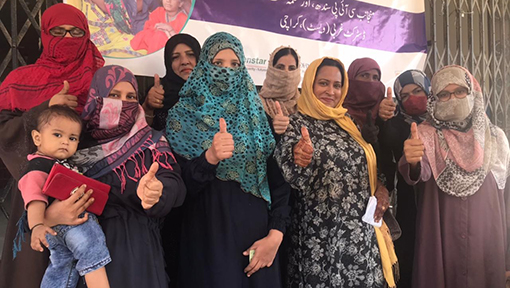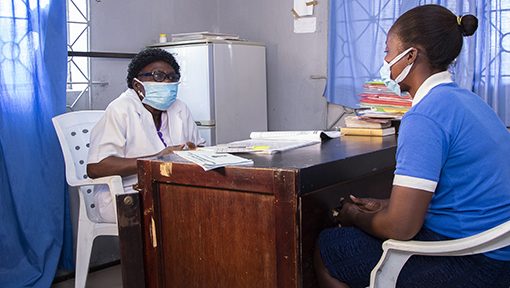System-Level Improvements Boost ASHAs’ Morale and Performance in Indore
Contributors: Trupti Sharma and Nitin Kumar Dwivedi
 The city of Indore has more than 605 urban Accredited Social Health Activists (ASHAs). Because their monthly meetings, payment vouchers and training schedules were centralized at the zonal level, it was difficult to update ASHAs on the latest programs, build their skills and provide routine feedback. Their monthly meetings, which are attended by about 100 ASHAs, were often spent submitting their vouchers, verifying and recording their payments, leaving little time for review and capacity building.
The city of Indore has more than 605 urban Accredited Social Health Activists (ASHAs). Because their monthly meetings, payment vouchers and training schedules were centralized at the zonal level, it was difficult to update ASHAs on the latest programs, build their skills and provide routine feedback. Their monthly meetings, which are attended by about 100 ASHAs, were often spent submitting their vouchers, verifying and recording their payments, leaving little time for review and capacity building.
The Challenge Initiative for Healthy Cities (TCIHC) team identified this issue during a mapping and listing exercise in 2018. In addition, they identified the need for better coordination between the Medical Officer-In-Charge (MoIC), Auxiliary Nurse Midwives (ANMs) (who supervise ASHAs) and ASHAs. They recommended establishing a local platform to allow weekly ASHA meetings to occur, per the National Urban Health Mission (NUHM) guidelines. Now, the ASHAs have weekly meetings with ANMs and the MoIC at the urban primary healthcare center (UPHC).
Earlier, we were not aware of our incentives or responsibilities except delivery and sterilization. Once TCIHC intervened, our meetings are formalized with our UPHC staff every Saturday. Now, we are regularly being updated about our programs and incentives. Now, we are well-versed about ASHA diary and the processes of voucher filling and submission, which we did not know earlier. Previously, we never received anything more than approx. USD $14 (INR 1000). Now, I am getting USD $55 to USD $70 (INR 4000 to 5000) every month. Last month, in July 2019, I received USD $70 (INR 5000) as an incentive for my performance.”
– an ASHA working in Bholetnath Colony, Indore
ASHA meetings started taking place at each facility every Saturday. The new arrangement has helped reduce the reimbursement time for ASHAs from four to five months to less than 45 days. The timely receipt of payment has motivated ASHAs and has improved their performance as well. HMIS data indicates a 44% increase in family planning uptake at the UPHCs from January 2019 to June 2019 when compared to the same period in the previous year. Also, between January and July 2019, approximately 90% of the ASHAs vouchers were cleared in the given timeline of 45 days.
These weekly meetings also help to resolve a number of logistical and referral issues. Since the ASHAs meet more frequently with the ANM and MoIC, they can discuss commodity stock outs and supply shortages. They can also bring up the issues related to delays at secondary facilities in treating clients referred by primary facilities. These weekly meetings are also being used as capacity building platforms to update the ASHAs on technical aspects of family planning, antenatal care and postnatal care, as well as government schemes available to ASHAs. For example, approximately USD $28,584 (INR 20,53,000) was disbursed to ASHAs under the government’s Essential Spacing of Births (ESB) scheme.
The entire effort has boosted ASHA morale since it has elevated their importance within the health system while also improving their knowledge and capacity. After noticing this improvement in the ASHAs’ performance, Indore’s Chief Medical Health Officer (CMHO) directed all Medical Officers-In-Charge of UPHCs to conduct weekly planning and review meetings at the UPHCs with ASHA and ANMs. The letter mentioned that programs like immunization, family planning, antenatal care (ANC), home visits by ASHAs for newborn care, etc. should be planned accordingly.
This streamlined process of submission of vouchers has reduced the load on MOIC and the entire system of processing of payment has been simplified. The timely release of payments of incentives has motivated the ASHAs to do more work and has also helped in reducing the attrition rate of ASHAs.”
– Indore’s CMHO






